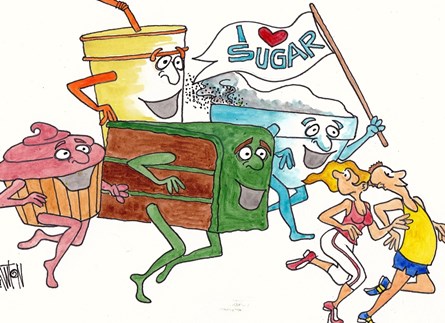Nutritional or dietary advice changes like the weather and we are never sure if today’s meat is tomorrows poison!

Remember the days when it was "Go to work on an egg", then it was no more than 3 eggs a week and now the advice we’re given is eat as many eggs as you like as although they have cholesterol, its apparently "good" cholesterol.
Then there’s the new superfoods; nutrient-rich foods considered to be especially beneficial for health and well-being. It’s a list that’s constantly gaining additions, with a few of those being beetroot juice, blueberries, walnuts, edamame beans, pomegranates, coconut oil, oily fish and avocados.
For years we’ve been told that for good health we should eat a low fat diet with plenty of fruit and vegetables. The general consensus was that low fat foods were better than full fat foods. Now we’re being told that the diet industry that produces a lot of these low fat foods supplement them with sugar to improve the flavour lost by reducing the fat content. We all thought that to lose weight we had only to count the calories and that fat was higher in calories than sugar and therefore to be avoided at all costs.
Now the nutritionists are saying that fat doesn’t make you fat but sugar does and is responsible for the increasing obesity crisis in the UK.
This debate has been going on for a long time and while there is really no good sugar that you can eat, fat can be good or bad for you, depending of what kind you choose.
Sugar comes in many guises on food labels, including:
corn sugar, dextrose, fructose, glucose, high-fructose glucose syrup, honey, maple syrup, agave syrup, isoglucose, levulose, maltose, molasses, sucrose, invert sugar
Table 1. (1)
The government recommends that free or added sugars shouldn't make up more than 5% of the energy (calories) you get from food and drink each day. That's a maximum of 30g of added sugar a day for adults, which is roughly seven sugar cubes. (2)
Added sugars are found in foods such as sweets, cakes, biscuits, chocolate, and some fizzy drinks and juice drinks – these are the sugary foods we should cut down on. For example, a 500ml bottle of cola contains the equivalent of 17 cubes of sugar!
If you want to lose weight, you need to find a diet plan that avoids refined sugars and uses only healthy fats. These are monounsaturated fats such as olive oil, sunflower oil and rapeseed oil instead of saturated fats like butter and dairy products. There is good evidence to show that there is a link between saturated fat and raised cholesterol levels.
Bad fats increase cholesterol and your risk of certain diseases, while good fats protect your heart and support overall health. In fact, good fats - such as omega-3 fats - are essential to physical and emotional health.
Therefore, a healthy diet shouldn’t cut out the fat but replace bad fats with the good ones that promote health and well-being.
Eating foods rich in monounsaturated and polyunsaturated fat can improve blood cholesterol levels and lower your risk of heart disease. These fats may also benefit insulin levels and control blood sugar, which can be especially helpful if you have type 2 diabetes. These good fats are found in fish, nuts, seeds, and cold-pressed vegetable oils. (3)
Trans fats raise your LDL or "bad" cholesterol and lower your HDL "good" cholesterol and increases your risk of heart disease, stroke, and diabetes. Any amount of trans fats is unhealthy. They are found in commercially baked goods such as biscuits, cakes, and pastry. Any product with "partially hydrogenated oil" in the ingredients contains trans fats.
When trying to lose weight, eating a balanced diet and being more active will help you lose weight steadily and gradually which is better for keeping weight off long term.
The traditional Mediterranean diet naturally includes most of the key diet changes that will help to lose weight and keep your heart healthy. This means that your meals should contain carbohydrates such as wholegrain bread and pasta and plenty of fruit and vegetables. (4)
Protein should be obtained by having more fish in your diet and less meat as well as including beans and pulses. You should also cut down on the foods that provide a lot of saturated fat in your diet such as dairy products and butter.
The healthiest diet is to cut out processed foods that are high in sugar and salt and cook from scratch as often as possible.
References;
- Dolson L. Verywell. How to spot hidden sugar in foods; 2016 Mar 6 [cited 2016 May 27]. Available from: https://www.verywell.com/sugars-many-disguises-2242526
- Choices N. Department of Health. How does sugar in our diet affect our health?; 2016 May 24 [cited 2016 May 27]. Available from: http://www.nhs.uk/Livewell/Goodfood/Pages/sugars.aspx
- Helpguide. Good fats, bad fats, and the power of Omega-3s [cited 2016 May 27]. Available from: http://www.helpguide.org/articles/healthy-eating/choosing-healthy-fats.htm
- Choices N. Department of Health. What is a Mediterranean diet?; 2016 Mar 17 [cited 2016 May 27]. Available from: http://www.nhs.uk/Livewell/Goodfood/Pages/what-is-a-Mediterranean-diet.aspx
Medically reviewed by: Superintendent pharmacist Margaret Hudson BSc(Hons)MRPharmS 02/06/16